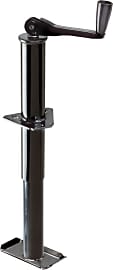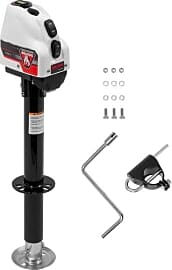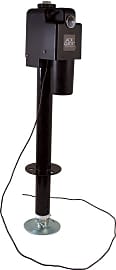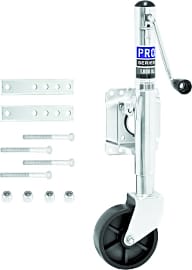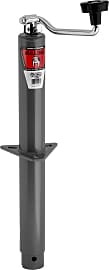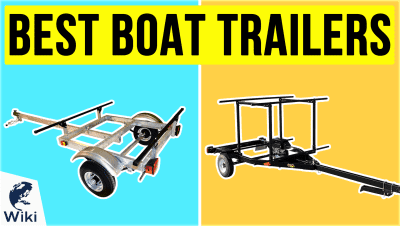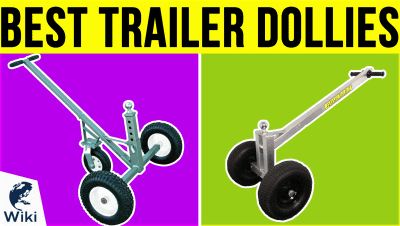The 10 Best Tongue Jacks

This wiki has been updated 35 times since it was first published in March of 2017. Whether you are looking for something to hold up your camper or a convenient solution for more easily hitching your boat trailer to your truck, these heavy-duty, reliable tongue jacks are up to the task. Our comprehensive list includes both electric and hand-powered models that are appropriate for a wide range of applications. They come in various capacities and in options to meet most budgets. When users buy our independently chosen editorial recommendations, we may earn commissions to help fund the Wiki.
Editor's Notes
September 16, 2020:
Tongue jacks is not a category that sees a lot of innovation from year to year, so it might not be much surprise to readers that there haven't been a whole lot of changes during this most recent update. What this shows is that most of our previous recommendations are as reliable as we thought and have stood the test of time. With that being said, we did make a couple of substitutions for various reasons.
We decided to eliminate the Goplus Classic and replaced it with the Uriah Products UC500010. While there is nothing wrong with Goplus products, and we may often suggest them in other categories, we were more confident recommending something from a brand dedicated to making towing equipment. After all, you will be relying on your tongue jack to support thousands of pounds and failure has the potential to cause injury. Further supporting our decision were some reports of it seizing up or that it just simply stopped working after a year or less. The Uriah Products UC500010 is a worthy addition for many reasons, not the least of which is its excellent balance of price and performance. It costs considerably less than many comparable models, yet has a higher maximum lifting capacity. The fact that it has an attached 7-way connector is just an added convenience and can eliminate the need for hardwiring.
The Big Horn Electric was removed due to simple availability issues. In its place we have the Bulldog 500200. Though more expensive, this latter option is more powerful and offers nearly four inches more of travel. Additionally, we appreciated its large, well-placed rocker switch that allows for comfortable operation.
While tongue jacks with wheels, like the Fulton Swivel and Pro Series EJ1000 can make it relatively easy to move your trailer a few inches to the right or left for attaching it to a hitch, if you plan on completely relocating a fully loaded trailer often, say from one side of a property to another, you will be better off getting yourself a trailer dolly.
June 02, 2019:
Joining the selection is the Goplus Classic, which can be left outside extensively without showing signs of rust, thanks to its protective black powder finish. It also features hardened steel gears, for years of reliable use. Like some others, this electric model conveniently offers a manual crank handle, so you won’t need a separate one on hand for backup.
For a top-notch automatic model that comes with a simple rocker switch, look to the Lippert Components Electric, which can be counted on to lift or lower a travel trailer RV with ease, with just the flip of a switch. It operates quietly and efficiently, thanks to its noise-reducing helical cut gears. It comes with four handy LED lights for use in the dark.
Those who prefer a sturdy manual choice can hardly go wrong with the Reese Towpower, which provides reposition capacity and includes a durable, weld-on mounting bracket. Its top-wind design ensures easier cranking, and its thread and trust bearings help bring down the force of friction. It features an easy-to-fold, cylindrical handle that locks securely into the storage position.
Special Honors
Snappin Turtle Power Tongue Jack This sturdy selection offers an 18-inch extension height and 5,000 pounds of instantaneous tongue breakaway capacity. You’ll appreciate its over-sized foot pad that minimizes, and sometimes fully prevents, divots; built-in leveling gauge; 12-volt LED nightlight; and weather-sealed switches. It’s backed by a 100% satisfaction guarantee and a one-year warranty for material and workmanship defects. snappinturtle.com
West Marine 1500 lb. Swivel Mount Designed specifically for boat trailer applications, the West Marine 1500 lb. Swivel Mount features a high-performance corrosion and UV-resistant finish that is rated to stand up to 600 hours of saltwater exposure. Additionally, its large, 8-inch wheel will be very helpful when you need to adjust the trailer position by hand. westmarine.com
Determining Your Lifting Capacity Needs
When looking at the lifting capacity rating on various models, it is important to note that this is for the tongue weight, and not the weight of the entire trailer.
The first thing to consider when buying a jack is its lifting capacity. Choose one that is too small, and it won't be able to lift the trailer safely, if at all. If you choose one that is too powerful, then you are just throwing away money needlessly. When looking at the lifting capacity rating on various models, it is important to note that this is for the tongue weight, and not the weight of the entire trailer.
If you can find a gross trailer weight rating somewhere on your trailer, then determining the lifting capacity you need is easy. The tongue weight is somewhere between 10 and 15 percent of the trailer weight when fully loaded. Even if you don't load your trailer to its maximum capacity, it is still best to err on the side of caution. We recommend choosing a jack capable of lifting slightly more than 15 percent of the gross trailer weight. If you have an older trailer though, the GTWR may no longer be legible. In this case you will have to calculate the trailer weight yourself.
If you are sure your tongue weight is 300 pounds or less, you can use a home scale to determine its exact weight. Place the scale on a sturdy stand that is roughly equal to the height of the coupler when it is attached to the towing vehicle. With the trailer fully loaded, place the coupler on the scale. The displayed weight is your trailer's tongue weight.
If you think your trailer's tongue weight is over 300 pounds, you can still use a home scale, you'll just need to rig up a couple of things. Take a brick roughly the same thickness as the scale and place it three feet away from the scale perpendicularly from the trailer. Set a small length of pipe across the scale, and one across the brick. Next take a flat beam and rest it across both pipes. Tare the scale to adjust for the weight of the beam and pipe. Make sure to put wheel chocks behind the trailer's tires to ensure it doesn't move anywhere. If your trailer still has the old jack attached to it, you can rest the jack's footplate or wheel on the beam one foot from the brick and two feet from the scale, with the coupler raised to the normal towing height. If you don't have a jack currently on your trailer, you will need to raise both the brick and scale up to your coupler's normal towing height before proceeding. Then place the coupler directly on the beam one foot from the brick and two feet from the scale. This should be done with the trailer fully loaded. Taking the displayed weight on the scale and multiplying it by three will give you the tongue weight of your trailer.
Different Needs For Different Uses
When choosing your tongue jack it is important to take into account what kind of trailer you have. A tongue jack on a boat trailer will be subjected to different stresses than one attached to an RV. If you have a boat trailer that is solely for freshwater use or are looking for a jack for RV use, then a simple powder-coated model will suffice. On the other hand, if you launch your boat in saltwater and are buying a steel jack, then it is important to buy a galvanized model, so it can stand up to this corrosive environment. Another option is to purchase an aluminum model, as this type of metal naturally stands up to saltwater corrosion, though it may oxidize and discolor over time.
Most recreational boat owners will want to choose a wheeled model.
When looking at tongue jacks, you will probably notice that some have a foot plate, whereas others have a wheel on the bottom. Each of these styles is better-suited to certain uses. Most recreational boat owners will want to choose a wheeled model. These allow users to move the trailer around more easily by hand, such as making small adjustments to its position when attaching it to the hitch. If you have a boat that is so heavy you will never push it around by hand, then there is no benefit to a wheeled model and you may as well choose one with a footplate for the extra stability it offers when uncoupled from a vehicle. The same goes for those looking to purchase a tongue jack for RVs.
Wheeled models generally come in three different styles: small single wheel, large single wheel, and double wheels. Small wheels have a tendency to dig in on soft surfaces like gravel and dirt, so we recommend a large single wheel when possible, unless you have a very small boat. Double wheels are a better option for larger boats, as they make it significantly easier for one person to move a trailer on any type of surface.
What Else To Consider When Choosing A Tongue Jack
Now that you know your lifting capacity needs, and what kind of trailer you should buy based on your use, it's time to look at some other factors that can play into your decision making process. Tongue jacks come in both bolt-on and weld-on models. For most users, a simple bolt-on model is probably best. They are generally more affordable, more readily available online and in stores, and don't require a professional to handle the installation. It is important to note however, that you need measure the width and height of your tongue before purchasing a bolt-on model to ensure it will fit properly.
It is also a smart idea to look at a tongue jack's travel distance. They generally have somewhere between eight and 15 inches of up and down travel. Ideally the more travel the better, as it will be more versatile to work with a range of vehicles. At the bare minimum you need a jack that can lift your trailer's tongue a few inches above the height of your hitch. Another thing to look at is the retracted height, especially if you often travel over rough terrain. The smaller the retracted height, the less chance of the jack hitting the ground as you drive over bumps.


